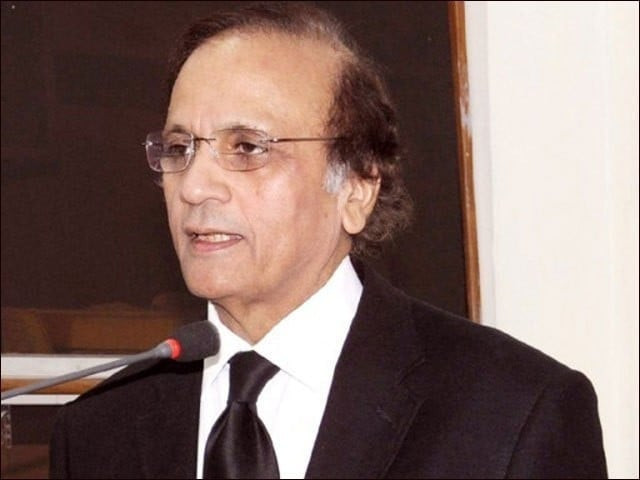Ex-CJ Jillani to helm IHC letter inquiry
Cabinet finalises ToRs for inquiry commission

The federal government on Saturday appointed former chief justice of Pakistan Tassaduq Hussain Jillani as the head of an inquiry commission tasked with investigating allegations of intelligence agencies meddling in the affairs of the Islamabad High Court (IHC).
The federal government on Saturday appointed former chief justice of Pakistan Tassaduq Hussain Jillani as the chief of an inquiry commission tasked with probing allegations that the county’s intelligence agencies are meddling into the affairs of the Islamabad High Court (IHC).
The decision to approve the formation of an investigation body and to nominate Jillani as its head was made during a meeting of the federal cabinet chaired by Prime Minister Shehbaz Sharif.
On Tuesday, six judges of the IHC—Justices Mohsin Akhtar Kayani, Tariq Mehmood Jahangiri, Babar Sattar, Sardar Ejaz Ishaq Khan, Arbab Muhammad Tahir and Saman Rafat Imtiaz—penned a letter to the Supreme Judicial Council (SJC), expressing their concerns about the "interference" of the intelligence agencies in the affairs of the court.
Against the backdrop of escalating clamour for inquiry, Chief Justice of Pakistan (CJ) Qazi Faez Isa convened a full court meeting of the top court judges the next day.
During a meeting between PM Shehbaz and CJP Isa on Thursday, it was decided to form a commission following the cabinet’s approval to probe into the concerns raised by the IHC judges.
The federal cabinet meeting on Saturday discussed the IHC judges’ allegations and finalised the Terms of Reference (TORs) for the inquiry commission.
According to the TORs, the commission will thoroughly investigate the allegations levelled in the letter written by the IHC judges and determine whether they were true or not. It will also find out whether or not any official was directly involved in the alleged judicial interference.
The TORs further stated that the commission would recommend action against any intelligence agency, department or government body based on the facts revealed in its investigation.
The commission will also have the authority to examine any other matter it deemed necessary during the course of its inquiry.
The cabinet rejected the allegations of the six IHC judges, terming them inappropriate.
Its members were of the unanimous opinion that the Constitution strongly believed in the principle of separation of powers of the three state institutions.
Read Six IHC judges seek SJC’s action over spy agencies interference
PM Shehbaz reiterated his complete faith in the independence of the judiciary and the principle of constitutional separation of powers. He also confided in the cabinet members about his consultation with the CJP on the letter.The commission will complete its inquiry within 60 days.
Justice (retd) Jillani had also expressed his willingness to lead the inquiry commission after being contacted by Minister for Law Azam Nazeer Tarar.
Talking to The Express Tribune, the former CJP said this was a “sensitive issue” and he had accepted the responsibility to lead the commission. “We will start our proceedings on it after Eidul Fitr,” he added.
To a query, he replied that it was not an open judicial proceeding.
“Whether it will be open or not, I will not say anything about it now because it is a sensitive matter. However, the commission will complete its proceedings in Islamabad.”
Justice (retd) Jillani further said the commission would complete its proceedings according to the rules and regulations decided in the full court.
The former CJP was nicknamed “a gentleman judge” for his mild manners.
In October 2017, the government had nominated him as an ad hoc judge in the International Court of Justice (ICJ) in the case of Indian spy Kulbhushan Jadhav.
Justice (retd) Jillani served as a judge of the Supreme Court from July 31, 2004 to December 11, 2013 and subsequently as the 21st CJP from December 12, 2013 to July 5, 2014.
He was born on July 6, 1949 in Multan and completed his Masters in Political Science from Forman Christian College and LLB from the University of Punjab.
He started his legal practice at the Multan district courts in 1974 and in 1976 was elected the general secretary of the district bar association.
He was elected a member of the Punjab Bar Council in 1978 and appointed assistant advocate general of Punjab in July 1979. He was enrolled as advocate of the SC in 1983 and appointed an additional advocate general of Punjab in 1993.
He took oath as a judge of the Lahore High Court on August 7, 1994 and was elevated to the SC on July 31, 2004 where he served till the imposition of the state of emergency on November 3, 2007. As he refused to take a fresh oath, he was made dysfunctional.
He took oath again as a judge of the SC in 2008.



















COMMENTS
Comments are moderated and generally will be posted if they are on-topic and not abusive.
For more information, please see our Comments FAQ